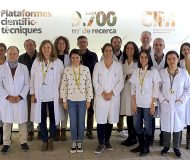

New research has shown that virgin olive oil enriched with its own phenolic compounds increases the ability of HDL particles (high-density lipoproteins) to transport cholesterol deposited on the arterial wall for subsequent elimination from the body, through the liver and intestine. The work, published in the journal Biomedicines, has been coordinated by researchers from CIBER in the areas of Diabetes and Associated Metabolic Diseases (CIBERDEM) and Physiopathology of Obesity and Nutrition (CIBEROBN), the Research Institute and Hospital de la Santa Creu i Sant Pau, the Hospital del Mar Institute for Medical Research (IMIM), Rovira i Virgili University, the University of Lleida and the Institute of Vine and Wine Sciences-ICVV.
Reference article: https://www.mdpi.com/2227-9059/8/8/266
The research, carried out in an experimental mouse model, has allowed us to evaluate that both virgin olive oil enriched with its own phenolic compounds and the phenolic compounds themselves were capable not only of improving the capacity of HDL to extract cholesterol from macrophage cells, but also to eliminate it from the organism. This mechanism is a reflection of one of the cardio-protective functions of HDL.
“The results of our study indicate that non-enriched olive oil, used as a control and as a preparation base for the enriched oil, was also able to promote this cardio-protective function of HDL. However, the results derived from enriched functional olive oil are its own phenolic compounds, significantly improving this protective capacity,” explains Juan Carlos Escolà, a researcher in the Cardiovascular Risk Metabolic Basis Research Group at the Sant Pau Hospital Research Institute – IIB Sant Pau, which is attached to CIBERDEM and is one of the main people responsible for the study.
The results of this research, together with those of previous studies of the groups involved in this work, would allow us to conclude that this olive oil enriched with its own phenolic compounds can be considered as a heart-healthy functional food.
An increased amount of antioxidant and anti-inflammatory phenolic compounds in the oil
Phenolic compounds are natural substances found in plants, fruits, vegetables, coffee or chocolate, among other foods, and have antioxidant and anti-inflammatory properties. “The functional oil used in this research was enriched with phenolic compounds typical of virgin olive oil, so its content of these compounds is higher than that which is usually present in virgin olive oil, thanks to an innovative technological process,” says Montserrat Fitó, CIBEROBN researcher at the Hospital del Mar Institute for Medical Research (IMIM). For this preparation procedure, first the phenolic compounds are extracted, basically the hydroxytyrosol derivatives of the olive paste of the arbequina variety and then they are incorporated to the oil in a determined concentration. Dr. Fitó adds that “in this way the enrichment allows the consumption of a greater amount of antioxidant phenolic compounds from the oil without increasing the consumption of fat”.
Reference article:
Cedó, L.; Fernández-Castillejo, S.; Rubió, L.; Metso, J.; Santos, D.; Muñoz-Aguayo, D.; Rivas-Urbina, A.; Tondo, M.; Méndez-Lara, K.A.; Farràs, M.; Jauhiainen, M.; Motilva, M.-J.; Fitó, M.; Blanco-Vaca, F.; Solà, R.; Escolà-Gil, J.C. Phenol-Enriched Virgin Olive Oil Promotes Macrophage-Specific Reverse Cholesterol Transport In Vivo. Biomedicines 2020, 8(8), 266;